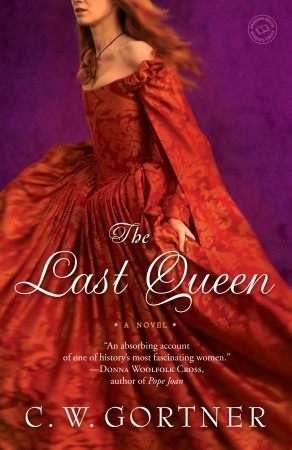
The Last Queen by C.W. Gortner
Ballantine Books
May 2009
Format: Paperback, 400 pages
First line: I was thirteen years old when my parents conquered Granada.
From the back cover: In this stunning novel,
C. W. Gortner brings to life Juana of Castile, the third child of Queen
Isabel and King Ferdinand of Spain, who would become the last queen of
Spanish blood to inherit her country’s throne. Along the way, Gortner
takes the reader from the somber majesty of Spain to the glittering and
lethal courts of Flanders, France, and Tudor England.
Born amid
her parents’ ruthless struggle to unify and strengthen their kingdom,
Juana, at the age of sixteen, is sent to wed Philip, heir to the
Habsburg Empire. Juana finds unexpected love and passion with her
dashing young husband, and at first she is content with her children and
her married life. But when tragedy strikes and she becomes heir to the
Spanish throne, Juana finds herself plunged into a battle for power
against her husband that grows to involve the major monarchs of Europe.
Besieged by foes on all sides, Juana vows to secure her crown and save
Spain from ruin, even if it costs her everything.
My thoughts: I’ve now read quite a few books by C.W. Gortner and I can honestly say I am a huge fan. His writing always seems to capture me, and I become totally enthralled with the stories he writes. I picked this one up because I had signed up to be part of the blog tour for Gortner’s latest book, The Queen’s Vow, a book about Queen Isabel, and wanted to read this one first. Although in chronological history, this book would actually come after the new one, it was published first. And, I believe it was through his research for this book that lead Gortner to want to explore Isabel’s life.
In The Last Queen, he explores the life of Juana of Castile, the daughter of Isabel of Castile and Ferdinand of Aragon. Known in history as Juana the Loca, Gortner takes us through her life, from her young, arranged marriage to Philip, the heir of Habsburg, to life in Flanders to her ultimately becoming the sole heir of the Spanish throne. Until becoming heir, she had adjusted to life in Flanders, taking as active a role in rearing her children herself as she could, much as her mother had done, and even going so far as to fall in love with her husband – something that was not too common amongst marriages based on political alliances. It was not until she became sole heir that we see a different side of Philip, and once back in Spain, even her father and one of her sons become so obsessed and driven by power that they work against her.
I went into this book not really knowing anything about Juana of Castile. I came away from the book thinking that I am glad to have not lived during a time where women were seen as nothing more than political and marital pawns. Juana, much like her mother, was a strong woman with an intense loyalty to her country. She was betrayed by all those around her and whether she was truly mad due to family genes or she was driven there, is hard to tell.
I found this to be a fascinating account of Juana’s life and will be looking for more books about her. Have you read anything about Juana of Castile? If so, what?
(I purchased this book.)